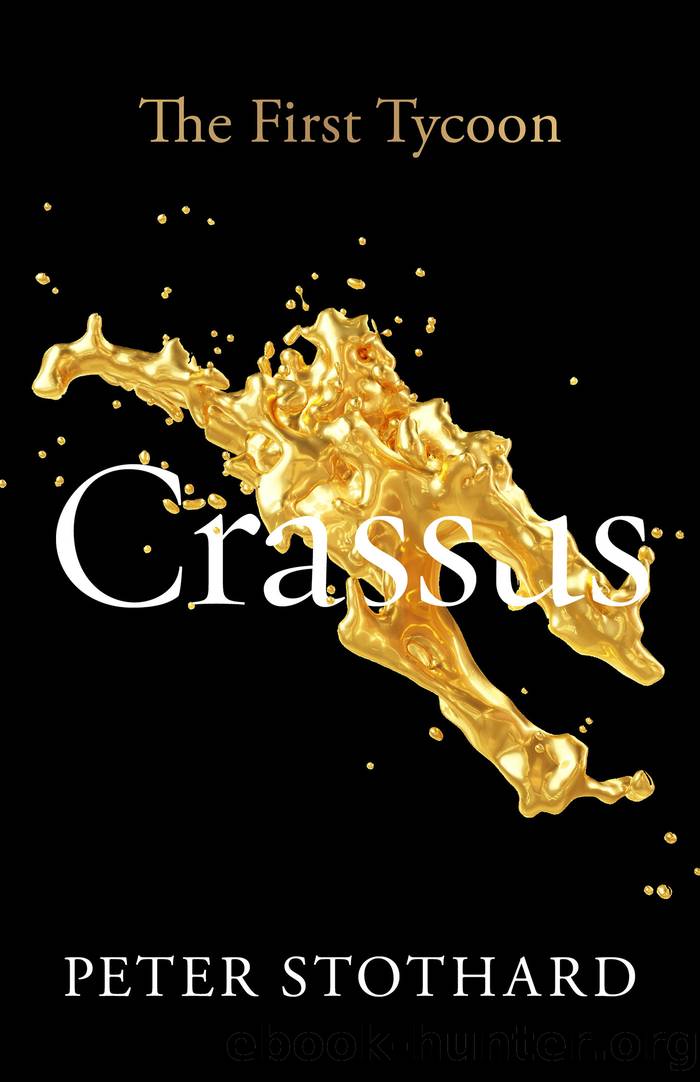Crassus by Peter Stothard;

Author:Peter Stothard;
Language: eng
Format: epub
Publisher: Yale University Press
Published: 2022-01-15T00:00:00+00:00
CHAPTER TWELVE
The Nature of Money
Aristotle had used the word economics for what in future centuries became known as politics. Politics was what Crassusâs tutor taught. Money was, by contrast, a household matter and sometimes, as rarely as possible for Crassus and Tertulla, the household had to be moved. Gold and silver had to be bound in chests, piled on carts, pulled by oxen, protected by slaves, and loaded onto ships, not all on one ship, an enterprise hard to justify and even harder to hide.
A year after the death of Catiline, Crassus feared that his years of control through cash and credit were coming to an end. Pompey was planning to return to Rome, and there seemed every possibility that he might copy the example of Sulla. Crassus had no great regard for Pompeyâs originality as a politician, however inventive he always seemed to be on the battlefield. Dictatorship and proscription might be his easiest options. Crassus did not want to be the most tempting target.
He decided to leave Italy. He might have gone to Spain or to southern Gaul, both places where he had supporters. Instead, he chose Asia. For one gift from Pompey, he could be grateful: pirate captains no longer controlled the seas. Roman ships could sail the Adriatic with hindrance only from heavy weather.
He did not have much time. Pompey, as was well known, was already preparing his own vast transfer of wealth from east to west, golden thrones of conquered kings, mountains of the coins that bore their heads, piles of looted pearls and precious stones, statues of long-dead Greek heroes, long lines of living slaves from the places whose kings he had created and whose borders he had drawn. Romans would see all this when the man whom he had first met as a fellow young officer with Sulla celebrated his second triumph. The ânew Alexanderâ was rumored to have captured the original red cloak of the old and would likely wear it, tossing coins to the crowd, turning money into power, turning the streets into streams of blood if that was what the ânew Sullaâ wanted to do.
Money could become anything but not always quickly. Crassus could mortgage his mines and lands for cash and promises of future cash but not at the best price if it was known he was leaving Rome and might never return. Most of Crassusâs wealth was in wax tablets, in handshakes, in subtle threats, sometimes not-so-subtle threats. Aristotle had called the lending of money unnatural and wrong (money was dead and should not bear fruit as does an apple tree), but Crassusâs tutor could ignore what his master might not want to hear. The debt tablets were most of what Crassus owned. They could come to Asia, but a handshake was worth less, maybe very much less, when the hand that gave it no longer held power.
Coins could be carried. The smaller might be needed on the journey. Aristotle was right about that part of his subject;
Download
This site does not store any files on its server. We only index and link to content provided by other sites. Please contact the content providers to delete copyright contents if any and email us, we'll remove relevant links or contents immediately.
| France | Germany |
| Great Britain | Greece |
| Italy | Rome |
| Russia | Spain & Portugal |
Fanny Burney by Claire Harman(26602)
Empire of the Sikhs by Patwant Singh(23085)
Out of India by Michael Foss(16853)
Leonardo da Vinci by Walter Isaacson(13336)
Small Great Things by Jodi Picoult(7141)
The Six Wives Of Henry VIII (WOMEN IN HISTORY) by Fraser Antonia(5515)
The Wind in My Hair by Masih Alinejad(5095)
A Higher Loyalty: Truth, Lies, and Leadership by James Comey(4963)
The Crown by Robert Lacey(4814)
The Lonely City by Olivia Laing(4801)
Millionaire: The Philanderer, Gambler, and Duelist Who Invented Modern Finance by Janet Gleeson(4478)
The Iron Duke by The Iron Duke(4354)
Papillon (English) by Henri Charrière(4274)
Sticky Fingers by Joe Hagan(4198)
Joan of Arc by Mary Gordon(4110)
Alive: The Story of the Andes Survivors by Piers Paul Read(4031)
Stalin by Stephen Kotkin(3965)
Aleister Crowley: The Biography by Tobias Churton(3640)
Ants Among Elephants by Sujatha Gidla(3467)
